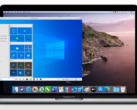You would expect a powerful system such as the fourth-generation MacBook Air to perform better than a tablet or smartphone, but just how much difference can one expect? Well, according to the popular AnTuTu benchmark a user can expect almost 50% faster performance, at least on that particular test site, compared to the next best iOS-related performer, which in this case is the 12.9-inch iPad Pro (fourth generation). With the help of the ARM-based M1 SoC, the MacBook Air chalked up 1,119,243 points (+48.19%) while the iPad Pro 4 managed 755,294.
Before moving on, some things have to be taken into account: The score for the iPad Pro 4 is based on an average result of likely thousands of tests whereas the M1/MacBook Air combo can be considered a maximum result at the moment. Also, AnTuTu reports that the M1 system was recorded as an iPad Pro running iOS 14.2, whereas the MacBook Air obviously runs on macOS. Looking at the AnTuTu benchmark and the comparison with the current iOS benchmark leader, it’s easy to see why Apple seems pretty pleased with its decision to switch to the ARM architecture for this powerful new SoC.
It’s not just the overall system performance of the Apple M1 and the new MacBook Air (8 GB + 512 GB) that takes it admirably beyond its predecessors; the individual UX (+38.66%), MEM (+64.98%), GPU (+43.78%), and CPU (+50.65%) scores are all well ahead of the iPad Pro 4 (6 GB + 128 GB) too. Of course, you would expect the memory discrepancies to offer an advantage to the MacBook Air, but the CPU and GPU differences are notable. With an over 50% performance gain, the CPU part of the M1 SoC makes the impressive A12Z Bionic look practically lethargic here. In AnTuTu, the ARM-based M1 in the late 2020 MacBook Air can just send the Apple silicon rivals home.
























